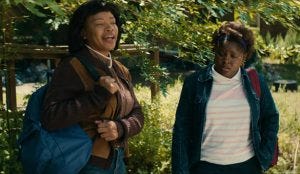Roxanne Roxanne
Netflix hasn’t found the same success for its original films like it has for its shows. Sure, “Mudbound” was just nominated for an Academy Award, and films like “Beasts of the Southern Wild” and “Okja” won praise, but no films have become phenomenons like “Stranger Things” or “Orange is the New Black.”
“Roxanne Roxanne” is the latest film to hit the streaming service and, while it won’t change opinions about Netflix films, it’s at least worth watching. The film is a biopic telling the story of Roxanne Shante, who became a hip-hop sensation in the early 1980's. She got her start as a child winning rap battles on the street, had a hit single as a teenager, but quickly faded.

As the film opens we find Shante and her three sisters living with their mother in a New York City project. Her mother has struggled to save up $20,000 dollars for a down payment on a house, which her boyfriend absconds with. The mother soon falls into an alcoholic depression and, already tough on her children, becomes unbearable to Shante.
Shante spends her time skipping school, rap battling for money, and stealing clothing. As her fame increases she finds herself on tour (her entourage includes rapper Biz Markie), falls for a much older man, and gets scammed in a similar fashion as her mother. The Hollywood trope where the protagonist achieves their dream and everything is ok is turned on its head and Shante finds herself in no better a position than before her fame hit.
“Roxanne Roxanne” is a compelling story and that may be its biggest flaw. There is too much story for just 100 minutes. While the movie makes for a decent introduction to the 1980's hip hop scene, it feels like just a teaser to push you towards the music history books. In fact the film is a third over before we even hear Shante rap. But the lack of immersion into the scene and culture isn’t the primary problem. Shante’s life is so rich with story and the creators try to tell all of it. This ends up making the movie feel like a jumbled mess of plotlines and themes. Is the movie about dependency on men? Is the film about sisterhood and solidarity? Is the film about mother and daughter? Is the film about hip-hop?

I don’t have answers for the questions above yet. All of these things make an appearance in the film. Many of these things are tied together. Most feel essential. It’s good when a film leaves you wanting more, but not when it’s because things feel missing. And “Roxanne Roxanne” left me wanting more on both accounts. I wanted to know more about Shante’s life—both because the film sold me on its subject and because it left too many blanks unfilled.
If anything, approach “Roxanne Roxanne” as an entry point. Watch the film and then find Julian Schnabel’s 1996 biopic “Basquiat.” Read Lorraine Hansberry’s “A Raisin in the Sun” (it’s a different era but those familiar with the story will notice immediate overlaps between “Roxanne Roxanne” and the fictional play), Google “1980's NYC hip-hop,” watch videos on Youtube, go to a record store and grab the must have albums.
There’s so many more stories to tell like “Roxanne Roxanne.” Hopefully this spurs more creators, Netflix, and the audience to dig deeper into the lives of those involved in the 1980's New York City hip-hop scene.
"Roxanne Roxanne" is currently streaming on Netflix.
https://www.youtube.com/watch?v=IKA8H_LolNM&w=585


